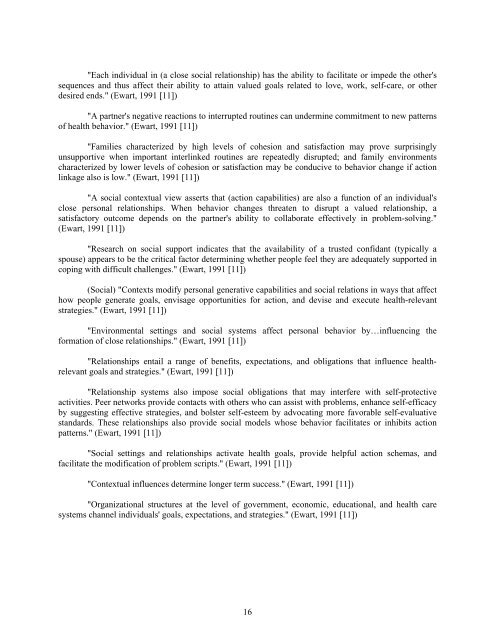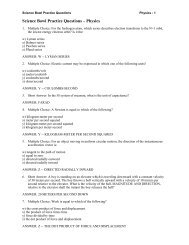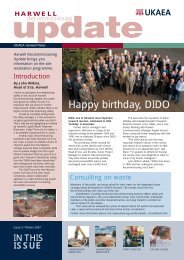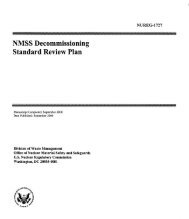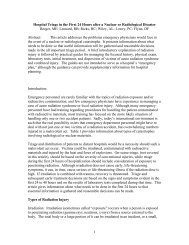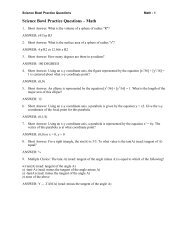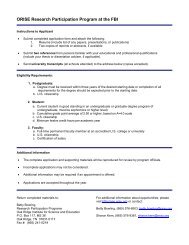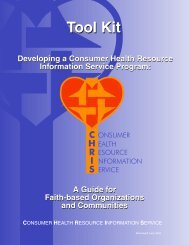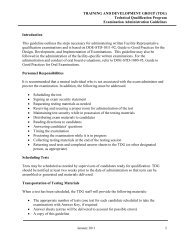Internal and external factors that encourage or discourage
Internal and external factors that encourage or discourage
Internal and external factors that encourage or discourage
Create successful ePaper yourself
Turn your PDF publications into a flip-book with our unique Google optimized e-Paper software.
"Each individual in (a close social relationship) has the ability to facilitate <strong>or</strong> impede the other's<br />
sequences <strong>and</strong> thus affect their ability to attain valued goals related to love, w<strong>or</strong>k, self-care, <strong>or</strong> other<br />
desired ends." (Ewart, 1991 [11])<br />
"A partner's negative reactions to interrupted routines can undermine commitment to new patterns<br />
of health behavi<strong>or</strong>." (Ewart, 1991 [11])<br />
"Families characterized by high levels of cohesion <strong>and</strong> satisfaction may prove surprisingly<br />
unsupp<strong>or</strong>tive when imp<strong>or</strong>tant interlinked routines are repeatedly disrupted; <strong>and</strong> family environments<br />
characterized by lower levels of cohesion <strong>or</strong> satisfaction may be conducive to behavi<strong>or</strong> change if action<br />
linkage also is low." (Ewart, 1991 [11])<br />
"A social contextual view asserts <strong>that</strong> (action capabilities) are also a function of an individual's<br />
close personal relationships. When behavi<strong>or</strong> changes threaten to disrupt a valued relationship, a<br />
satisfact<strong>or</strong>y outcome depends on the partner's ability to collab<strong>or</strong>ate effectively in problem-solving."<br />
(Ewart, 1991 [11])<br />
"Research on social supp<strong>or</strong>t indicates <strong>that</strong> the availability of a trusted confidant (typically a<br />
spouse) appears to be the critical fact<strong>or</strong> determining whether people feel they are adequately supp<strong>or</strong>ted in<br />
coping with difficult challenges." (Ewart, 1991 [11])<br />
(Social) "Contexts modify personal generative capabilities <strong>and</strong> social relations in ways <strong>that</strong> affect<br />
how people generate goals, envisage opp<strong>or</strong>tunities f<strong>or</strong> action, <strong>and</strong> devise <strong>and</strong> execute health-relevant<br />
strategies." (Ewart, 1991 [11])<br />
"Environmental settings <strong>and</strong> social systems affect personal behavi<strong>or</strong> by…influencing the<br />
f<strong>or</strong>mation of close relationships." (Ewart, 1991 [11])<br />
"Relationships entail a range of benefits, expectations, <strong>and</strong> obligations <strong>that</strong> influence healthrelevant<br />
goals <strong>and</strong> strategies." (Ewart, 1991 [11])<br />
"Relationship systems also impose social obligations <strong>that</strong> may interfere with self-protective<br />
activities. Peer netw<strong>or</strong>ks provide contacts with others who can assist with problems, enhance self-efficacy<br />
by suggesting effective strategies, <strong>and</strong> bolster self-esteem by advocating m<strong>or</strong>e fav<strong>or</strong>able self-evaluative<br />
st<strong>and</strong>ards. These relationships also provide social models whose behavi<strong>or</strong> facilitates <strong>or</strong> inhibits action<br />
patterns." (Ewart, 1991 [11])<br />
"Social settings <strong>and</strong> relationships activate health goals, provide helpful action schemas, <strong>and</strong><br />
facilitate the modification of problem scripts." (Ewart, 1991 [11])<br />
"Contextual influences determine longer term success." (Ewart, 1991 [11])<br />
"Organizational structures at the level of government, economic, educational, <strong>and</strong> health care<br />
systems channel individuals' goals, expectations, <strong>and</strong> strategies." (Ewart, 1991 [11])<br />
16


